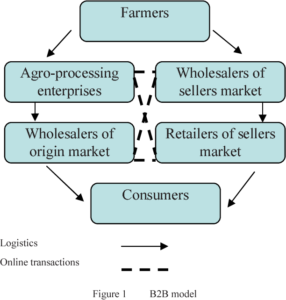E-commerce and agricultural commodity trading encounter certain critical challenges. Research revealed that customers with high overall trust are more inclined to purchase online, yet fundamental information on agricultural products is difficult for consumers to validate and trust.

Meanwhile, the most critical issues encountered by e-commerce enterprises, particularly in developing nations, are cash on delivery and logistics services. Furthermore, e-commerce merchants must manage time-consuming small orders with various goods, resulting in significant operational expenses for e-commerce enterprises.
Blockchain technology may give appropriate answers to several of these issues:
(1) Information protection.
(2) Payment options: Blockchain Technology offers a zero-interest digital payment system. Furthermore, using cryptocurrency to transact agricultural products will significantly lower transaction costs.
(3) Consumer assurance: The blockchain’s distributed accounting system is time-stamped via the decentralized process, ensuring that all information on the chain is visible and unmodifiable. Consumers will be free of imposters and reclaim faith in e-commerce.
(4) Reduce farmers’ costs: Households generate a wide range of agricultural goods. Because of the low transaction volume and tiny size, traditional e-commerce is neither willing nor able to provide services for them, thus eliminating these market players. Blockchain technology has the potential to significantly lower transaction costs and reintegrates them into the market.
Some businesses are already putting this technology to use; however, it may not be used throughout the entire process. For example, utilizing blockchain technology, all commodities in the Old Farmers’ Shopping Mall, an e-commerce firm in China’s Hubei Province, can be traced back to their origins, and all manufacturing details can be requested by customers.
Before the commodities are placed on the platform, detailed information such as sowing, watering, fertilizing, and de-worming has been recorded. They also offer fundamental producer information, shipping logistics, storage days, and storage temperature. Customers will simply need to scan the unique QR code on the items to get all the information.
The use of blockchain technology in e-commerce and agricultural commodity trade is still in its initial stages, and the current situation is far from ideal. For example, how to confirm the legitimacy of the data uploading procedure into blockchain remains a challenge. The Internet of Things (IoT) might be a future answer. Furthermore, the distributed, non-tamperable, and traceable qualities of blockchain must be extensively and thoroughly investigated in order to increase the productivity and efficiency of agricultural production and commerce.
